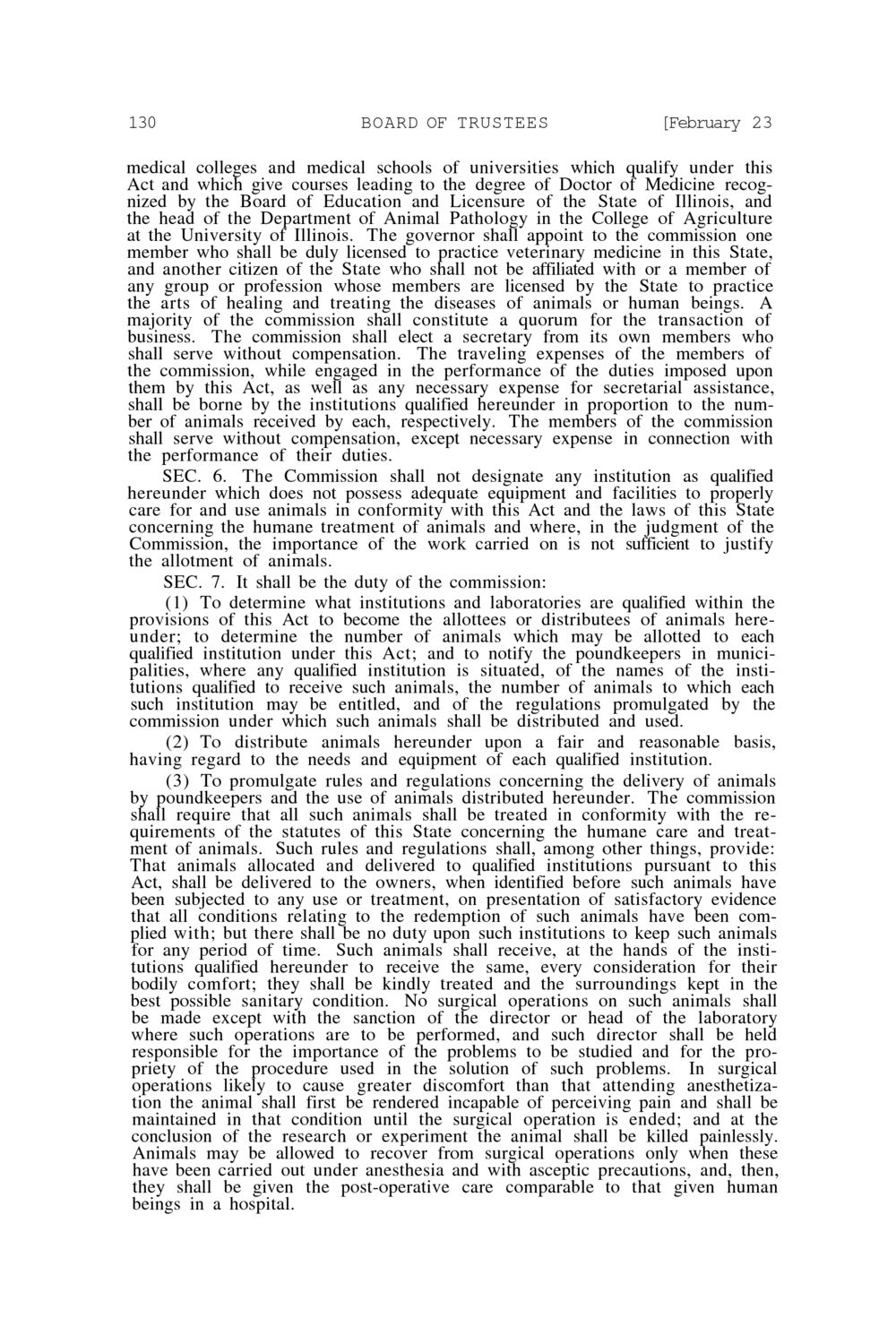| |
| |
Caption: Board of Trustees Minutes - 1936
This is a reduced-resolution page image for fast online browsing.

EXTRACTED TEXT FROM PAGE:
130 BOARD OF TRUSTEES [February 23 medical colleges and medical schools of universities which qualify under this Act and which give courses leading to the degree of Doctor of Medicine recognized by the Board of Education and Licensure of the State of Illinois, and the head of the Department of Animal Pathology in the College of Agriculture at the University of Illinois. The governor shall appoint to the commission one member who shall be duly licensed to practice veterinary medicine in this State, and another citizen of the State who shall not be affiliated with or a member of any group or profession whose members are licensed by the State to practice the arts of healing and treating the diseases of animals or human beings. A majority of the commission shall constitute a quorum for the transaction of business. The commission shall elect a secretary from its own members who shall serve without compensation. The traveling expenses of the members of the commission, while engaged in the performance of the duties imposed upon them by this Act, as well as any necessary expense for secretarial assistance, shall be borne by the institutions qualified hereunder in proportion to the number of animals received by each, respectively. The members of the commission shall serve without compensation, except necessary expense in connection with the performance of their duties. SEC. 6. The Commission shall not designate any institution as qualified hereunder which does not possess adequate equipment and facilities to properly care for and use animals in conformity with this Act and the laws of this State concerning the humane treatment of animals and where, in the judgment of the Commission, the importance of the work carried on is not sufficient to justify the allotment of animals. SEC. 7. It shall be the duty of the commission: (1) To determine what institutions and laboratories are qualified within the provisions of this Act to become the allottees or distributees of animals hereunder; to determine the number of animals which may be allotted to each qualified institution under this Act; and to notify the poundkeepers in municipalities, where any qualified institution is situated, of the names of the institutions qualified to receive such animals, the number of animals to which each such institution may be entitled, and of the regulations promulgated by the commission under which such animals shall be distributed and used. (2) To distribute animals hereunder upon a fair and reasonable basis, having regard to the needs and equipment of each qualified institution. (3) To promulgate rules and regulations concerning the delivery of animals by poundkeepers and the use of animals distributed hereunder. The commission shall require that all such animals shall be treated in conformity with the requirements of the statutes of this State concerning the humane care and treatment of animals. Such rules and regulations shall, among other things, provide: That animals allocated and delivered to qualified institutions pursuant to this Act, shall be delivered to the owners, when identified before such animals have been subjected to any use or treatment, on presentation of satisfactory evidence that all conditions relating to the redemption of such animals have been complied with; but there shall be no duty upon such institutions to keep such animals for any period of time. Such animals shall receive, at the hands of the institutions qualified hereunder to receive the same, every consideration for their bodily comfort; they shall be kindly treated and the surroundings kept in the best possible sanitary condition. No surgical operations on such animals shall be made except with the sanction of the director or head of the laboratory where such operations are to be performed, and such director shall be held responsible for the importance of the problems to be studied and for the propriety of the procedure used in the solution of such problems. In surgical operations likely to cause greater discomfort than that attending anesthetization the animal shall first be rendered incapable of perceiving pain and shall be maintained in that condition until the surgical operation is ended; and at the conclusion of the research or experiment the animal shall be killed painlessly. Animals may be allowed to recover from surgical operations only when these have been carried out under anesthesia and with asceptic precautions, and, then, they shall be given the post-operative care comparable to that given human beings in a hospital.
| |